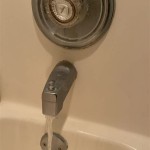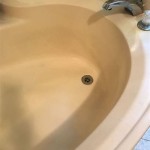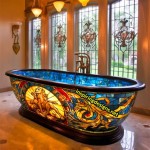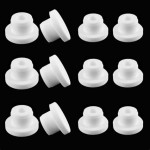Bathtub Types: Choosing the Right Material for Your Bathroom Oasis
The bathtub is a centerpiece of any luxurious bathroom, inviting you to unwind and rejuvenate after a long day. But choosing the right bathtub material can be overwhelming with a wide range of options available. This comprehensive guide will delve into the essential aspects of bathtub materials, empowering you to make an informed decision that complements your bathroom design and personal preferences.
1. Acrylic: Durable and Affordable
Acrylic bathtubs are renowned for their durability and affordability. Manufactured from a blend of polymers and resins, they are lightweight, easy to install, and resistant to scratches and dents. The non-porous surface inhibits mold and mildew growth, ensuring long-lasting hygiene. Acrylic bathtubs are available in a wide range of colors and designs, providing ample flexibility for customization.
2. Cast Iron: Classic and Durable
Cast iron bathtubs exude a timeless elegance and unparalleled durability. Their robust construction ensures exceptional longevity, withstanding heavy use and maintaining their pristine appearance for decades. Cast iron's excellent heat retention properties keep bathwater warm for extended periods, providing a luxurious and relaxing soak. However, their weight and potential for chipping may require additional precautions during installation and care.
3. Porcelain-Enameled Cast Iron: Beauty Meets Strength
Porcelain-enameled cast iron bathtubs combine the durability of cast iron with the smooth, non-porous surface of porcelain. The vitreous enamel coating offers excellent resistance to scratching, staining, and discoloration, ensuring years of pristine aesthetics. These bathtubs are available in a wide range of colors, providing both classic and contemporary options to complement various bathroom designs.
4. Fiberglass: Lightweight and Budget-Friendly
Fiberglass bathtubs are an economical choice, offering a lightweight and durable construction. The fiberglass material is reinforced with resins, creating a solid and stable bathtub. Fiberglass's affordability makes it an attractive option for budget-conscious homeowners. However, it may be more susceptible to scratching and discoloration compared to other materials.
5. Natural Stone: Luxurious and Unique
Natural stone bathtubs, such as marble, granite, or limestone, bring a touch of nature's elegance to the bathroom. Each stone has its unique grain patterns and color variations, resulting in a truly distinctive bathtub. Natural stone is durable and heat-resistant, providing exceptional performance and style. However, the porous nature of stone requires regular sealing to prevent staining and moisture absorption.
6. Wood: Warmth and Character
Wooden bathtubs exude a rustic charm and natural warmth. Crafted from durable hardwoods, such as teak or cypress, these bathtubs are naturally water-resistant and can withstand moisture without warping. The warm, earthy tones and organic textures of wood create a cozy and inviting ambiance in the bathroom. However, wooden bathtubs require regular maintenance to protect against water damage and maintain their pristine appearance.
7. Copper: Timeless and Antimicrobial
Copper bathtubs are not only visually stunning but also possess antimicrobial properties. The rich, reddish-brown patina of copper adds a touch of timeless elegance to the bathroom. Copper is naturally resistant to corrosion and bacteria, creating a hygienic and aesthetically pleasing bathing experience. However, its high cost and potential for tarnishing require careful consideration.
Conclusion: Choosing the Perfect Bathtub Material
The choice of bathtub material ultimately depends on your personal preferences, bathroom design, and budget. Each material offers unique advantages and drawbacks. Consider the following factors when making your decision:
- Durability and longevity
- Resistance to scratches and stains
- Heat retention properties
- Weight and ease of installation
- Aesthetics and design versatility
- Maintenance and cleaning requirements
By carefully weighing these factors and exploring the various materials available, you can select the perfect bathtub that will enhance your bathroom's functionality, style, and personal enjoyment for years to come.
How To Choose The Best Bathtub Material A Comparison Guide Vevano

4 Common Bathtub Materials Pros Cons What To Buy For Your Bathroom

What Bathtub Material Is In My Bathroom Maryland Tub Tile

Common Types Of Bathtub Materials Pros And Cons

Types Of Freestanding Bathtubs Central Plumbing And Heating Supply

16 Types Of Bathtubs To Help You Relax Bathe In Peace Worst Room

A Quick Bathtub Guide 3 Diffe Types Of Bathtubs Amp Mate

Types Of Bathtub Materials W Atelier Malaysia

Types Of Bathtub Materials W Atelier Malaysia

3 Material Types To Considered For Best Luxury Freestanding Bathtubs Acqua Viva
Related Posts








